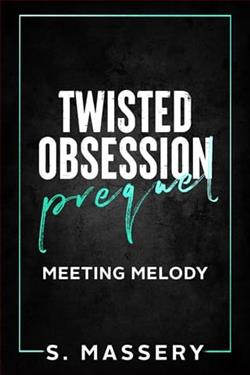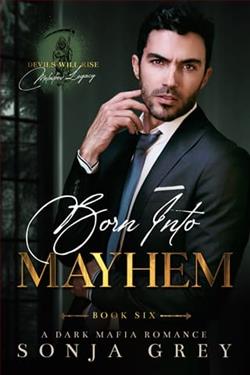Page 44 of Aftermarket Afterlife
“This is not how I expected my life was going to go. Isn’t it wonderful?”
—Enid Healy
In transit to a comfortable if creepy family home in Columbus, Ohio
WHEN NOT DROPPING MYSELFonto a specific level of the afterlife, I move too quickly to truly say that I was occupying the twilight, or the starlight, or anywhere at all. I still existed, but I existed in a void, of sorts. I sometimes thought I might be crossing through the space that used to belong to the crossroads, when they were still something I needed to be concerned about. Which might mean I was taking shortcuts through the backyard of the anima mundi, and would eventually need to rethink that whole “don’t mess with gods” idea.
Then I was standing in the room at Angela and Martin’s that had been turned into a bedroom for the two children. Charlotte and Isaac were close enough in age that they could share space without keeping each other awake all the time, and young enough that the fact that they were basically brother and sister wasn’t an issue yet. They wouldn’t want privacy for a few more years, and if they told the various adults they interacted with about sharing a room, it wouldn’t trigger unfortunate questions. Alex and Shelby had been sharing the only open room in the house for ages, and creating a nursery had required finally gutting Andrew’s childhood bedroom. Sarah still stayed at the house enough that converting her room was out of the question. Alex was making inquiries around the neighborhood for homes that might be going on sale soon. If he found one, the family would help with the purchase cost, adding it officially to their collective holdings, and he and Shelby would be able to move out with Lottie, leaving Isaac to have his own room.
But that was a matter for the future. The children were huddled together in one of the beds, clinging to each other. Charlotte stopped crying in order to sniffle and look at me appealingly, tears still leaking from her eyes as she freed one arm and reached for me. She had gotten the full family package, where looks were concerned; Alex marrying Shelby had only reinforced the family’s tendency toward cherubic-looking blue-eyed blondes. Isaac, on the other hand, had the black hair and eerily blue eyes universal to cuckoos. He looked almost exactly like a younger version of Sarah, down to the white glow in his pupils, which guttered out and died as I looked at him.
He’d learned pretty quickly that telepathic compulsions didn’t work well on me. They could sometimes be used to snare Shelby, who didn’t always remember to put on her anti-telepathy charms, but everyone else in the house was resistant, for one reason or another. Instead, he held up his arms in a silent, pleading gesture.
“What do we say when we want to be picked up, Isaac?” I asked.
His face screwed up in momentary frustration before he said, “Up, please, Mary.”
“That works,” I said, and hoisted him onto my hip as I moved to check on the sniffling Charlotte. She looked at me pleadingly, then sat up in the bed and reached for me with both arms.
“Me, too, please, Mary,” she said.
“It’s a good thing there’s only two of you; I’m already out of hands,” I said, scooping her up and resting her on my other hip. “Can I put either of you down? I won’t be able to open the door if I’m carrying you both.”
Both children wailed in what sounded like genuine fright and latched on to me, clinging tight as limpets. They weren’t as verbal as they should have been at their age, and the language skills they did have seemed to have mostly deserted them in the face of their fear. I squeezed them close, trying to bounce them enough to calm them down. They were getting too big for this sort of thing, a natural transition between the stages of childhood that never failed to break my heart a little. It was wonderful to watch my charges turn bit by bit into people with opinions and ideas that they could actually articulate, rather than tiny people whose idea of a good time was trying to flush a banana down the toilet, but I always missed the days when they were small and I felt like I could keep them safe.
I didn’t feel that way right now. They were both still crying, and Charlotte had wrapped her arms around my neck, squeezing tightly. If I’d needed to breathe, it would have been a problem.
“Honey, Mary needs you to stop trying to strangle her,” I said, voice a little strained. Mimicking a human form means mimicking things like vocal cords, and when they get squeezed, they don’t work as well. “It won’t hurt me, but your mommy won’t appreciate it.”
Something fell over in the hall outside with a resounding crash. My head whipped around, staring at the door, and both children stopped crying like a switch had been flipped. It was eerie, the way they cut off, voices going silent in unison. I looked at Isaac. His eyes were white from side to side. I’d seen them cloud before, but I’d never seen them go all the way white.
Cuckoos too young to have unlocked their ancestral memories aren’t really in control of their powers. Everything they do is instinctual and can generally be written off as normal baby behavior. Sure, their parents tend to be more conscientious about serving dinner on time and laxer about making them do chores, but not to such a degree that it really becomes noticeable. If Isaac was exerting himself to—I presumed—tell Charlotte to stop crying, it was because he was frightened to the point of seeing the need.
I moved back to the closer bed and lowered them both to the mattress, making shushing noises when they whimpered and clutched at me. As soon as I pulled my hands away, the two children grabbed hold of each other, clinging so tightly that their grips looked painful. I straightened and turned toward the door.
The crash hadn’t been repeated. It might have been my imagination. But Isaac’s eyes were still white, and both children were still silent.
It wasn’t my imagination.
Carefully, I stuck my head through the door and looked toward the sound of the crash. It would be an odd sight, I knew, a white-haired woman’s head emerging out of solid wood. In the moment, I didn’t particularly care.
Angela had a comfortably old-fashioned sense of home décor, and was fond of little decorative tables with pretty things on top of them—vases of flowers, or small ceramics. Nothing too expensive; it was all the sort of thing you could find at any thrift store or estate sale, the detritus of a thousand grandmothers’ collections that had been liquidated when their minimalist grandchildren didn’t want their dust-catching treasures. Despite her youthful appearance, Angela was closer to the grandparents’ generation than the grandchildren, and she was happy to give their ceramic clowns and porcelain dancers a home.
She’d been saying lately that she’d need to pack up her treasures soon, to keep the children from hurting themselves as they grew older. Looked like she should have started sooner, because there was a garish blue and yellow vase in shards on the floor, next to the broken remains of a teak accent table. There were no people. I stepped fully through the door into the hall, looking in both directions.
There weren’t really any footprints. Sadly, the vase had been empty when it broke, so I didn’t have the convenient guide of water on the floor. There were, however, more shards of vase kicked to one side than made sense from impact alone, and so I took a guess and started walking in that direction, dialing down my solidity just enough to be sure my own footsteps would make no sound.
I turned the corner to find two unfamiliar figures in black tactical armor, their faces covered by mirrored helmets, walking in a shooter’s crouch, automatic rifles in their hands. If I’d been an actual member of the Price family, instead of an adjunct, I could probably follow that up with make and model number, but I’m not, and I’ve never been a big fan of firearms. They were big and looked lethal and that was enough for me to not like these two strangers having them.
I folded my arms and cleared my throat, remaining insubstantial. “Excuse me,” I said. “This is a private home. Were you invited?”
Both of them spun around, and one fired a burst of bullets which passed straight through my torso to impact with the wall behind me. It was an exterior wall; the repairs would be expensive, but no one was likely to have been hurt. That was the only thing that kept me from losing my temper more than I already had. I narrowed my eyes.
“Gonna take that as a no,” I said. “You can leave now.”
“Ghost,” said the one who’d fired with disgust, straightening up. “No threat.”
“Excuse me?” I asked. “No threat? What?”















